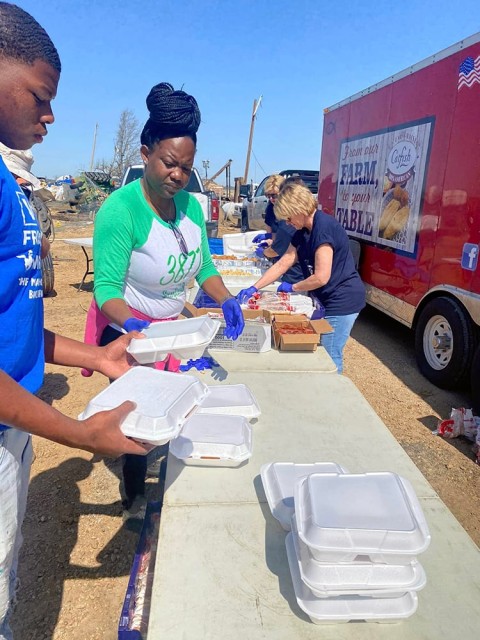Faith-based volunteers show up to help after Mississippi tornadoes

When volunteers show up after a disaster like this past weekend’s deadly tornadoes in Mississippi, some bring chainsaws, tarps and heavy equipment.
Donnie Wedgworth and his friends bring catfish.
On Monday, Wedgworth and a group of church friends—who call themselves the Catfish Navy—were frying up catfish, french fries, and hush-puppies, planning to serve about 600 meals to local residents and first responders in Silver City, Mississippi, one of the small, rural towns affected by Friday’s tornado, which killed 26 people.
The volunteer group, which hails from Greensboro, Alabama, a town of fewer than 3,000 people, served another 500 meals on Sunday before a thunderstorm forced them to shut down.
Wedgworth, an elder at a Presbyterian church, said most of the folks in the group knew each other from working in the catfish industry. There are also Baptists and Methodists in the group of senior citizens.
“The youngest person with us is 60,” he said.
Faith-based volunteers like Wedgworth are often among the first on the ground to help clean up after major disasters. Many are senior citizens who have devoted time and energy to getting prepared to lend a hand. For Wedgworth and his friends, that meant getting a 24-foot trailer a few years ago to carry their cooking equipment.
They set up in Silver City after talking with other faith-based disaster-relief groups. Wedgworth said that other groups are often set up to help larger communities and stay long-term. The group he’s part of works best in small towns and shows up as soon as they can.
For Wedgworth, responding to a disaster feels like the right thing to do.
“I do like helping people, and we do like serving God,” he said.
Baptists from Mississippi and Arkansas have set up disaster-response sites in Rolling Fork, where much of the town was destroyed by the tornado, and in the town of Armory. Hubert Yates, director of Mississippi Baptist Disaster Relief, said the group will likely continue to work in both areas for at least six weeks. Volunteer teams will bring chainsaws and heavy equipment to clear trees, he said, and they’ll also be helping residents get tarps on their roofs.
“We’ll also see what needs develop,” said Yates, who said that Baptists may also set up mobile kitchens and other forms of assistance in the weeks to come.
Other faith-based groups, like Mennonite Disaster Services, are currently talking with their volunteers and assessing whether or not to get involved with the immediate response in Mississippi.
Darin Bontrager, a regional operations coordinator of Mennonite Disaster Services, said that the group already has 10 long-term projects going in other parts of the Eastern United States. Some of those projects, like rebuilding in Mayfield, Kentucky, and Lake Charles, Louisiana, are about to go on hold due to a lack of volunteers during the summer months.
He said Mennonites may wait until the initial clean-up and response—that disaster-aid groups like the Southern Baptists excel at—is over before beginning any work in Mississippi. Mennonites tend to focus on long-term rebuilding but do have some volunteers who are trained in cleanup efforts.
Bontrager said that the number of disasters in recent years has left relief groups stretched thin.
Still, he said, disaster relief is one place where different faith groups as well as secular groups work as partners—coordinating their efforts and playing to their strengths.
“There’s nothing like a disaster to bring people together,” he said. —Religion News Service





